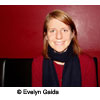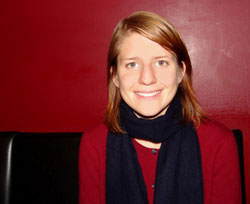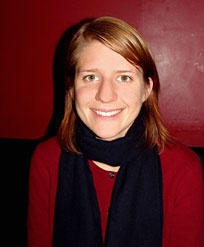AVIVA-Berlin >
Interviews
AVIVA-BERLIN.de im Februar 2026 -
Beitrag vom 06.11.2011

Interview with Markûˋta IrglovûÀ
Evelyn Gaida
Before playing a soulful and inspiring concert at "Babylon", where Markûˋta IrglovûÀ and her band received a standing ovation, the Oscar winner, pianist and singer met with AVIVA-Berlin ...
... for a mint tea and an interview.
Although IrglovûÀôÇs first solo album "Anar", released on October 11th, beautifully speaks for itself, the 23-year-old Czech musician has an amazing history. At the age of 17, IrglovûÀ was cast for the female leading role in the Irish independent movie "Once" (2007) through her friendship with Glen Hansard, vocalist and guitarist in the band "The Frames". The movie won the Audience Award at the Sundance Film Festival 2008 and earned 20 million dollars in cinemas worldwide despite a budget of only 180,000 dollars. IrglovûÀ and Hansard also received the Oscar for Best Song ("Falling Slowly") in the same year. They continued to play music together and toured as "The Swell Season".
After the soundcheck for her Berlin show, IrglovûÀ took AVIVA-Berlin on a spoken journey from the Irish countryside to the centre of Manhattan, talked about the liberating process of creating "Anar" and how winning the Oscar changed her life.
AVIVA-Berlin: You lived near Dublin for a couple of years and moved to New York one and a half years ago. What brought about this decision?
Markûˋta IrglovûÀ: I was actually living in the Irish countryside, two hours by car from Dublin, right by the sea, but with very few people around. It was very quiet, kind of an agricultural part of Ireland. It suited me fine, because I used to go there for a break after a tour, thatôÇs what I wanted, just to rest. Then I knew "The Swell Season" was taking a break for a little bit and I was thinking about what I wanted to do with my time. I decided that I didnôÇt want to stop making music just yet, because I didnôÇt want to lose the momentum. We had been working so hard and weôÇd been taking things to a certain level. I wondered what place I could bring that to by myself. It was becoming clear to me, that I couldnôÇt do recordings where I lived in the countryside. First I thought I would move to the centre of Dublin, but this just didnôÇt feel right somehow. I listen to my intuition a lot, because itôÇs so difficult, sometimes you donôÇt know what the next step is, there is no textbook to look for the answer. So the only thing I thought was reliable as guidance is my own instinct. I kept thinking, what other cities in the world do I like? One morning I woke up and I felt a real urge to go to New York. I packed up my bag, got my ticket and thought, if I find an apartment, IôÇll move, if I canôÇt, itôÇs not meant to be.
AVIVA-Berlin: What was the impact of this big change?
Markûˋta IrglovûÀ: It worked immediately. I was putting myself in the middle of all the action. I moved to the centre of Manhattan. I was taking it all in, walking around Manhattan all day, every day, really getting to know the city, going to clubs to hear live music. I was socializing a lot, which was kind of unusual for me. I decided to embrace the experience of it.
|  |
ôˋ Evelyn Gaida |
AVIVA-Berlin: So it wasnôÇt a shock moving from the countryside to such a big city?
Markûˋta IrglovûÀ: No, the fact is, when youôÇre ready for something, it doesnôÇt come as a shock, no matter how different it is from what you were doing before. I made a conscious decision, I knew what I was getting myself into. After nearly a month of living there I met
Aida (Shahghasemi, percussionist) in
Zora Space. We were playing music together, so I already had found what I was looking for, which were musicians. In her I found a wonderful musical partner, she would join me on any deployment I had. She became such a part of what I do at the moment, my record and the way I think about my music, that I canôÇt imagine doing it without her. So whatever I came looking for in New York, I found very fast. Now I live in Brooklyn, I moved a bit away from all the chaos in Manhattan. I rarely go out anymore, because the time is limited and sometimes you just want to rest. I cook my own food at home, I meet friends at home. I just have a different experience of New York at the moment.
AVIVA-Berlin: What was the main inspiration that made you create this album?
Markûˋta IrglovûÀ: I think, just the window of opportunity. When I was in "The Swell Season" I was touring a lot with Glen, I didnôÇt really have an ambition to break up and get my own band going. I was very happy with my role there. It was only when Glen started talking about taking some time off that I had to think of something else to do. I thought, well, I have a few songs that never got recorded, IôÇll just do a little demo. But once I put myself into the mindset of writing the songs just started coming. Every time I would sit at the piano I would write a new song, which was very unusual for me. I just followed the inspiration, it came together very fast. I wrote the album in less than a year, recorded and mastered it all in one year. I was surprised by that, I had not anticipated it at all.
AVIVA-Berlin: Was it different for you to make a solo record compared to being part of "The Swell Season"?
Markûˋta IrglovûÀ: It was. The main difference being that I would make all the decisions. Within "The Swell Season" it was mostly Glen. IôÇm a very opinionated person in terms of I know what I want and like. IôÇm not afraid to express it. But I donôÇt think that my way is the right way all the time. So I never would try to make it my way, if Glen disagreed. Our relationship was always such that I looked up to him and he was my teacher all these years. It took me a long time to think that my opinion would matter as much as his did. Even if we differed he always had the final say, except for my songs. On the songs that I wrote, the production would be exactly like I wanted it to be. It was like that for the whole of this record.
AVIVA-Berlin: What sound did you want to achieve with this album?
Markûˋta IrglovûÀ: It was very much one step at a time. At first I only wanted to record three songs and make a small EP I could share with people. But once I put my mind to that, a whole bigger spectrum opened. Suddenly I had enough songs for a whole record. I was thinking to myself, well, IôÇll just make a whole record then, why not? Once I heard all the songs that I was writing I started getting the picture of the kind of record I would like to make, which was very simple, very transpired. Pretty much like an acoustic record, where you heard exactly when an instrument came in and what it was doing. I wanted to make a very peaceful, harmonious record which captured that year of the songs being written, because the songs embody that time. They are like time capsules, memoirs of what I was thinking about then and put into the lyrics. I just decided thatôÇs the kind of sound I was going to aim for and thatôÇs why I decided to work with
Tim (Iseler, sound engineer, bass player and IrglovûÀôÇs husband), who produced the record with me. We think of sounds and music very similarly. I always found working with him very easy, because there was very little explaining I had to do. He either understood the thing I wanted very well or he wanted the same thing and just did it by himself. I also knew that I wanted Aida to be a big part of it. When I had it recorded,
ANTI-, the label that put out our "Swell Season" records, heard I was doing an album and asked, if they could listen to it. Once they heard it, they asked me, if they could put it out, which was incredible for me, because again: I had no expectations when I got into this project and yet every time I got to the end of what I had planned, a whole bigger room opened.
AVIVA-Berlin: What does the title "Anar" (Persian for pomegranate) mean to you as an image?
Markûˋta IrglovûÀ: I like the idea of signs. There is this walk in Spain called Santiago de Compostela, it is a pilgrimage. The symbol of that walk is a shell. To let you know that youôÇre still on the path of the pilgrim, they put shells on the trunk of a tree, on the pavement, on a lamppost, because youôÇre just walking through the countryside. So, recurring things become a symbol like that to me, if IôÇm still on the right path. For some reason the pomegranate was just that at the time. After two weeks of seeing pomegranates everywhere, I walked into a gallery where this
Iranian painter exhibited her work. She had this wonderful painting of a pomegranate. I bought it and asked the artist, if I could use it for the album artwork. Then I started looking up the pomegranate on the internet, and it turns out, that itôÇs actually a very symbolic fruit overall and in all religions around the world. It means different things, but it pretty much is about fertility and feminine energy. That seemed like a beautiful symbol as an overall key to the record, because it was a very fertile, creative time for me in my life, when I was writing all those songs. Also the record has very much feminine energy. When I used to work with Glen, what I enjoyed the most is that he brings the male energy to it and I bring the feminine energy. He has the dynamic of being passionate on his guitar or vocally, he can be really loud and at the same time really soft. But I donôÇt have as much dynamic as he does. Rather than aiming for distorted sounds, I aim for peaceful and harmonious sounds of all the instruments and vocals coming together. This CD kind of lacks the male element that Glen used to add to my songs, but at the same time thatôÇs ok, because itôÇs something else. So the whole record is very feminine to me and thatôÇs why I love the pomegranate being a symbol of that, it summarizes that somehow.
|  |
ôˋ Evelyn Gaida |
AVIVA-Berlin: Looking back at the extraordinary whirlwind experience of winning the Oscar at a very young age and suddenly having a lot of media attention, what is the most outstanding to you about this experience and how has it changed your life?
Markûˋta IrglovûÀ: I was very aware even at the time that getting to play our song on that stage in the Oscar night, not even winning, just standing on the stage and playing our song, was like the golden key in itself. The world gave us this platform to present ourselves on. I was very grateful for the opportunity and I was aware how generous it was, because really, it doesnôÇt get much better than that in terms of reaching people. What you do with that from here on is completely your own responsibility. This is like a gift. I was very happy at the time and even afterwards I could see how indeed it worked, because things started coming in, offers from people, like a snowball started getting bigger and bigger and bigger. Of course there were things about it that were stressful: We were working hard and for a while I felt a little crowded out, because there was very little privacy and space to just be alone and quiet, which I need. Everybody needs that. But at the same time all the things that were challenging were a wonderful opportunity to rise above and learn from it. I think that the biggest gift this experience has given me is the opportunity to learn all these things about myself. All these years have just been packed, packed, packed with information and I really try to take it all in and make something out of it. ThatôÇs been wonderful, because now IôÇve lived through certain things that I donôÇt have to repeat, should I not choose to. Also the idea of how much weôÇve connected with people all over the world. ThatôÇs been incredible, because thatôÇs what I aim to do with my music. I write it, because I want to connect with people out there. Now itôÇs provided me with that history that no one can take away from me and itôÇs gonna serve me with whatever else I choose to do. ItôÇs serving me now with this solo project that IôÇm not starting completely from scratch. There have been so many positives coming out of that, I couldnôÇt count them on both hands.
AVIVA-Berlin: YouôÇve partly answered my last question already, which would have been, what youôÇd like to achieve with your music, not career-wise, but personally and for your audience? Connecting with people?
Markûˋta IrglovûÀ: It is. ItôÇs the idea that somehow what I create is gonna resonate with somebody in a way that they can relate to and empathize with it. I think all of us go through the same things emotionally and experientially, we go through the same patterns within ourselves and within our relationships. Sometimes when youôÇre in it, itôÇs hard to see what exactly is going on, because you donôÇt have the perspective. If something is right in front of you, you only see the little bit thatôÇs right here, but youôÇre not seeing the bigger picture. If you see the same thing in a movie or read about it in a book or hear your friend telling you exactly the same situation that gives you the perspective to step away from it a little bit. It helps you go back to your thing and deal with it in another way. I would like to provide that to the world, because thereôÇs so much out there for me I find every day, so IôÇm very conscious. The lyrics that I write are very premeditative, thereôÇs a particular message in every song that I try to communicate. The lyrics are very important, just as much as the music. If I feel the audience might not understand, because the lyrics are in English, I always try to introduce the songs in a way that helps people understand what the song is about, find something in it, whatever it is, they may find. ThatôÇs my hope. I prefer it to be an exchange with people. That would be the ideal. Actually I hear responses from people all the time. The most wonderful thing about the responses to the new record has been, that everybody likes a different song. Not just two songs, every single song somebody likes.
AVIVA-Berlin: Thank you very much for the interview, all the best and good luck for the show!
More Information at:marketairglovamusic.comwww.facebook.com/MarketaIrglovaseanrowe.netwww.facebook.com/seanrowemusicRead more at AVIVA-Berlin: Marketa Irglova - Anar